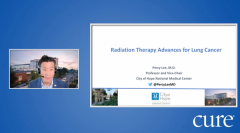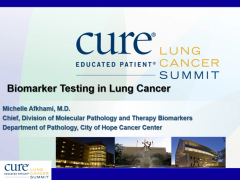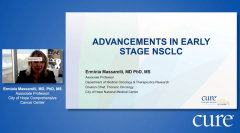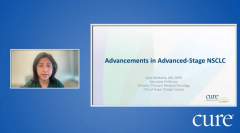
Educated Patient® Lung Cancer Summit Biomarker Testing Presentation: April 29, 2023
Watch an expert discuss biomarker testing during the CURE® Educated Patient® Lung Cancer Summit.
When it comes to diagnosing and treating patients with cancer, the era of personalized medicine has changed the treatment paradigm for patients, according to Dr. Michelle Afkhami.
“We are in the best era that we can be, which is the era of personalized medicine,” Afkhami said during a presentation at the CURE® Educated Patient® Lung Cancer Summit.
At the CURE Educated Patient Summit, summit chair Dr. Ed Kim, presented on the topic on Dr. Afkhami's behalf.
Afkhami, the chief of the division of molecular pathology and therapy biomarkers in the Department of Pathology at City of Hope Cancer Center, discussed the advances in cancer care that have been made in recent years thanks to genetic testing via means such as City of Hope’s HopSeq comprehensive panel of more than 700 genes and an upcoming rapid lung panel with an anticipated turnaround time of less than three days.
“With next generation sequencing having this comprehensive panel, now (it) is faster and more available, both in academic and commercial settings, both for clinical care and research,” Afkhami said. “You know, communication between the different teams is key. That multidisciplinary team of oncologists, surgeons, radiologists and pathologists, we are discussing these results daily at our genomic tumor board for each negative and positive test to make sure that we actually give the best approach for diagnosis, prognosis and therapy of our patients.”
Lung cancer, Afkhami said, has been a longtime concern in the oncology field. But the situation shows signs of improvement thanks to increasingly sophisticated methods of testing and treatment.
“One (piece of) good news is with the recent advances in all the new technology, and especially the biomarker testing, targeted therapy, precision medicine and personalized medicine, the cancer death rate in the U.S. continued to decline specifically for lung cancer and other (cancers, including) skin (cancer),” she said.
Afkhami explained the basics and background of biomarker testing.
“When you go to your oncologist, you hear that 'We're going to do molecular testing on your tissue.' Molecular tests are (used) to detect for specific gene changes in the cancer cell. That means that we can use a certain targeted therapy, but also it helps in diagnosis and giving our patient the prognosis for the cancer,” Afkhami said.
In addition to molecular testing, other forms of biomarker testing include immunohistochemistry studies and fluorescence in situ hybridization (FISH) tests.
Who should receive biomarker testing?
“Any advanced stage lung adenocarcinoma, if you look at your pathology report, you see a stage 3B and 4, they are the candidate,” Afkhami said. “And by morphology, when we look at it as a pathologist, any adenocarcinoma or any tumor with (an) adenocarcinoma component, other biopsies that (are) also suspicious for presence of adenocarcinoma, and also a squamous cell carcinoma, especially when (found in a) younger patient or (a) never-a-smoker patient, they have (the) possibility that (they) have an oncogenic driver and maybe the target therapy is appropriate for them.”
For more news on cancer updates, research and education, don’t forget to














